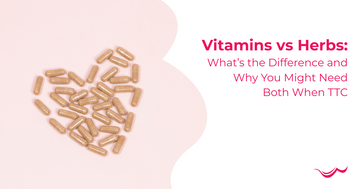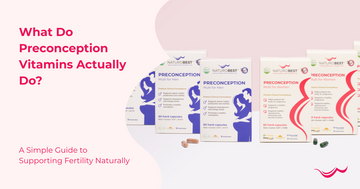What Are the Best Vitamins to Promote Pregnancy?
by NaturoBest Naturopath Team on Jun 10, 2025

Deciding to start or grow your family is an exciting, life-changing journey. But if you’re trying to conceive, you’ve probably realised that fertility is about more than just timing. It’s also about nourishing your body with the right nutrients to create the best possible environment for conception.
At NaturoBest, we believe in empowering women with knowledge and high-quality, evidence-based nutrition to support their fertility and wellbeing. Backed by research, the following vitamins and minerals are some of the most essential for boosting your chances of pregnancy naturally.
1. Folate (Vitamin B9): The Essential Pregnancy Preparation Nutrient
Folate is widely known for its role in early foetal development, but did you know that taking the right form of folate before conception can make a significant difference? Research suggests that women with MTHFR gene mutations may struggle to absorb synthetic folic acid properly, making 5-MTHF (Quatrefolic®) a better choice.
2. Vitamin B12: Boosting Energy & Egg Quality
If you’ve been feeling tired, run-down, or struggling with irregular cycles, you might be low in B12. Studies show that B12 works alongside folate to improve egg quality, especially in IVF patients.
3. Vitamin B6: Your Hormonal Best Friend
If your cycles are irregular or you struggle with PMS, B6 may be your missing piece. Research links higher B6 levels with increased fertility rates, and it's also known for reducing pregnancy nausea.
4. CoQ10: Giving Your Eggs an Energy Boost
Think of CoQ10 as the "battery charger" for your eggs. Studies show that CoQ10 supplementation can more than double your chances of pregnancy, especially if you're in your 30s or 40s.
5. Omega-3 Fatty Acids: The Fertility-Friendly Fats
Omega-3s balance hormones, reduce inflammation, and support implantation. Research also shows that higher omega-3 intake is linked to better pregnancy outcomes.
6. Zinc: Small but Mighty for Reproductive Health
Zinc plays a key role in ovulation, hormone regulation, and egg quality. Research shows that zinc deficiency can lead to irregular cycles, miscarriage, and even preterm birth.
7. Selenium: Protecting Your Fertility for the Long Run
Selenium is an antioxidant powerhouse that protects your eggs from oxidative stress and plays a role in reducing miscarriage risk.
8. Iron: Preparing for a Healthy Pregnancy
Iron is crucial for ovulatory function and reducing the risk of anaemia, which can affect your ability to conceive. However, it's best to boost iron levels before pregnancy, as first-trimester supplementation can increase nausea. That way you can take an iron-free prenatal vitamin in the first trimester when it's likely you're feeling queasy.
9. Vitamin A: Supporting Egg & Embryo Development
Vitamin A is found in high concentrations in follicular fluid, showing its importance for oocyte development. Betacarotene is the safest way to get fertility-friendly vitamin A without the risk of toxicity. It is important when supplementing with betacarotene to take lutein alongside it.
10. Inositol: A Game-Changer for PCOS Fertility
If you have PCOS or insulin resistance, inositol is a must. Research shows that 2g of inositol twice daily significantly improves egg quality and ovulation.
A Natural Approach to Fertility, Backed by Evidence & Hope
If you’re on the path to pregnancy, you’re not alone. With the right nutritional support, your body can become the perfect environment for new life to begin. Your body is capable of incredible things. With the right nutrients, you can set the foundation for a healthy pregnancy before you even see those two pink lines!
Next Steps: Take Control of Your Preconception Health
✅ Consider a high-quality preconception multivitamin that includes these key nutrients.
✅ Start early! Many of these vitamins work best when taken at least 3-6 months before conception and should be taken in conjunction with a preconception care plan.
✅ Consult your healthcare provider to tailor your supplement regimen to your unique needs.



